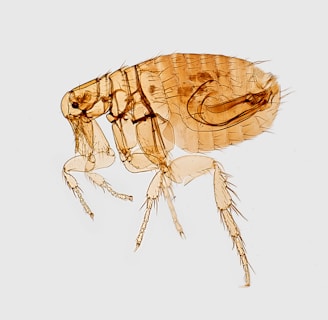External Parasites
Identification, Prevention, and Holistic Treatment
HYGIENE & SANITATION HEALTH
By: Stephanie
1/9/20243 min read


Introduction
External parasites, such as fleas, ticks, lice, leeches, mosquitoes, and biting flies, can be a nuisance and pose health risks to both humans and animals. In this article, we will explore how to identify and detect these parasites, as well as natural methods to deter and repel them. Additionally, we will discuss holistic treatments for preventing and treating diseases transmitted by these parasites.
Identifying and Detecting External Parasites
Before we delve into prevention and treatment, it is crucial to understand how to identify and detect external parasites. Here are some key characteristics to look out for:
Fleas: Tiny, wingless insects that are reddish-brown in color. They are often found on pets and can cause itching and discomfort.
Ticks: Arachnids that attach themselves to the skin of animals and humans. They can vary in size and color, and their bites can transmit diseases such as Lyme disease.
Lice: Small insects that infest the hair or feathers of animals and humans. They can cause itching and irritation of the scalp or skin.
Leeches: Worm-like creatures that attach themselves to the skin and feed on blood. They are commonly found in freshwater environments.
Mosquitoes: Small flying insects that feed on the blood of animals and humans. Their bites can transmit diseases such as malaria and dengue fever.
Biting flies: Various species of flies that bite and feed on blood. They can cause irritation and transmit diseases.
Natural Deterrents and Repellents
While there are numerous chemical-based products available in the market to combat external parasites, many people prefer natural alternatives due to concerns about potential side effects. Here are some natural methods to deter and repel external parasites:
Essential Oils: Certain essential oils, such as lavender, eucalyptus, and citronella, have natural repellent properties. Dilute a few drops of these oils in water and spray the mixture on yourself or your pets to repel parasites.
Herbal Repellents: Some herbs, including neem, rosemary, and lemongrass, have insect-repelling properties. You can create a herbal spray by boiling these herbs in water and applying the cooled mixture to your skin or pet's fur.
Diatomaceous Earth: This natural powder, made from fossilized algae, can be sprinkled in areas where parasites are likely to hide, such as pet bedding or outdoor spaces. Diatomaceous earth dehydrates and kills parasites upon contact. Be selective of where you put this, as it will kill beneficial insects, as well as pests.
Clean Environment: Regularly clean your living spaces and pet's bedding to minimize the presence of parasites. Vacuuming, washing bedding in hot water, and keeping outdoor areas well-maintained can significantly reduce the risk of infestation.
Preventing Diseases Transmitted by External Parasites
External parasites can transmit various diseases, including malaria, Lyme disease, and bubonic plague. Taking a holistic approach to prevent these diseases is essential for maintaining overall well-being. Here are some holistic treatments:
Malaria: To prevent malaria, it is crucial to avoid mosquito bites. Use natural mosquito repellents, sleep under mosquito nets, and eliminate stagnant water sources around your home where mosquitoes breed.
Lyme Disease: If you live in an area prone to ticks, take precautions such as wearing long-sleeved clothing, using tick repellents, and performing regular tick checks after spending time outdoors. Consult with a holistic healthcare provider for additional preventive measures.
Bubonic Plague: While rare, bubonic plague can be transmitted by fleas. Preventing flea infestations in your home and on your pets is crucial. Regularly groom and bathe your pets, wash their bedding, and consider using natural flea repellents.
Holistic Treatment after a Parasite Bite
If you or your pet has been bitten by an external parasite and contracted a disease, it is important to seek immediate medical attention. In addition to conventional medical treatment, there are holistic approaches that can support the healing process:
Herbal Remedies: Certain herbs, such as garlic, turmeric, astragalus, ledum palustre (homeopathic), and echinacea, have immune-boosting properties and can aid in the recovery from parasitic diseases. Consult with a qualified herbalist or holistic healthcare provider for appropriate dosages and guidance.
Healthy Diet: A nutrient-rich diet can help strengthen the immune system and support the body's healing process. Incorporate fresh fruits, vegetables, and whole grains into your meals, and avoid processed foods and excessive sugar.
Stress Reduction: Chronic stress can weaken the immune system. Engage in relaxation techniques such as meditation, yoga, or spending time in nature to reduce stress levels and promote healing.
This information is for educational purposes only.
Conclusion
External parasites can be a nuisance and pose health risks, but with proper identification, prevention, and holistic treatment, you can minimize their impact on your well-being. By utilizing natural deterrents and repellents, adopting a clean environment, and taking a holistic approach to prevent and treat diseases transmitted by these parasites, you can enjoy a healthier and parasite-free life.